Guilin, in the Guanxi province of China, is in the southern part of the country, unlike Beijing. As such, it is somewhat tropical. It rains heavily every day at 4 pm. The feeling is lush and the landscape is gorgeous. It is really more the China I imagined than Beijing. There are majestic mountains, pagodas, women in cheongsams, rickshaws. My sister and I flew Air China down to Guilin from Beijing. During the flight, of course they showed us the obligatory safety movie, but man, the one on Air China was truly dramatic! They showed people crouching for safety during an emergency, leaving the plane by chute – even getting on to the life raft in the middle of the ocean! We were waiting for the scene where they kick people off the life raft for dragging down the others, you know, survival of the fittest. It was crazy. We were laughing our butts off.
At the airport in Guilin we were a bit perplexed as to where to go, but followed the crowd out to the taxi stand, where a middle aged woman yelled, “taxi!” and grabbed our bags. My bag is full of sketchbooks and is quite heavy, but the woman hurls it into the trunk like it weighs two ounces.
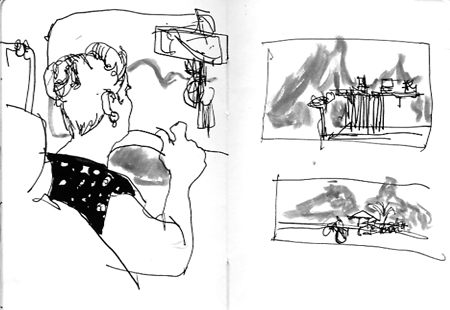 The woman spoke no English (besides ‘taxi’) but kept looking at us in the back seat of her cab talking animatedly in Mandarin, undaunted by our assertions of “wo bu ting, wo bu ting.” (as in, we don’t get it!) She was fantastic, a one-man band – laughing, talking on the phone, hollering out at other drivers who went by. The best part: halfway through the ride her phone rings, she answers it, and then hands it to my sister saying, “It’s for you.” Ha! In the middle of Guanxi province and my sister gets a phone call on the cab drivers cell? Patty asked me, “what should I do?” I said, “Answer it, it’s for you!” So anyway, she gets on the phone and some guy says to her (in English) “The woman driving your cab is my sister…so…can I interest you in any tours while you are here in Guilin?” HYSTERICAL! The scam factor continues…and it did continue through our entire stay in Guilin. It was not as in-your-face as the street vendors in Beijing were, but in some ways it was worse. I swear I think that the entire city was in communication as to how many yuan were in our pockets, and how they could get us to leave them in Guilin.
The woman spoke no English (besides ‘taxi’) but kept looking at us in the back seat of her cab talking animatedly in Mandarin, undaunted by our assertions of “wo bu ting, wo bu ting.” (as in, we don’t get it!) She was fantastic, a one-man band – laughing, talking on the phone, hollering out at other drivers who went by. The best part: halfway through the ride her phone rings, she answers it, and then hands it to my sister saying, “It’s for you.” Ha! In the middle of Guanxi province and my sister gets a phone call on the cab drivers cell? Patty asked me, “what should I do?” I said, “Answer it, it’s for you!” So anyway, she gets on the phone and some guy says to her (in English) “The woman driving your cab is my sister…so…can I interest you in any tours while you are here in Guilin?” HYSTERICAL! The scam factor continues…and it did continue through our entire stay in Guilin. It was not as in-your-face as the street vendors in Beijing were, but in some ways it was worse. I swear I think that the entire city was in communication as to how many yuan were in our pockets, and how they could get us to leave them in Guilin.
Not that I can really blame them. The city is surrounded by farms, and the people are working hard, really hard. I actually saw two people yoked to a plow working a field. My God. And you will see people in Guilin walking down the street using those yokes with pails attached. It’s very nineteenth century. So I find myself a bit more sympathetic to the hustle in Guilin than I was in Beijing, but still it amazes me.
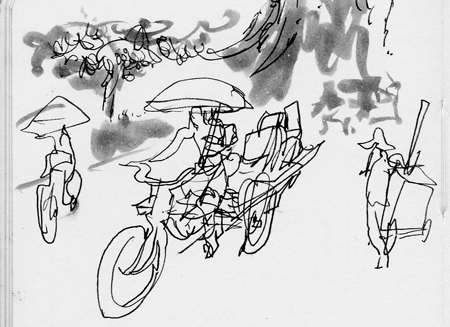
This drawing is a typical street scene. All day long, people rode by on bicycles, mopeds and walked with the yokes and pails. Our hotel was on the street facing the Li River. It was a nice hotel, but had faded quite a bit since its glory days in the 1970s. Almost to proclaim its age, the hotel management piped in music by the Carpenters 24/7. The manager was a Scottish man, I saw him one day, walking through the lobby in his kilt with a young Chinese woman in a cheongsam on either arm. The feeling it gave me is indescribable. If you’ve ever seen the movie, Island of Doctor Moreau and remember the character played by Val Kilmer you’ll get the sensation that the manager gave me. I suspect he screwed up somewhere in London and the hotel chain sent him to Guilin in order to get rid of him. Watching him walk through the lobby while sitting in my 1970’s style rattan chair, listening to the song Hopelessly Devoted to You, from the movie Grease, was the height of surreal moments in China…
Anyway, to get back to Guilin: the city thrives on tourism and many of the tourists are newly rich Chinese men from Shanghai on vacation with their young girlfriends. I can see why they come here. We took a boat trip down the Li River, which is like saying we took a boat trip through a classic Chinese painting. Beautiful. It’s like some kind of fantasy.
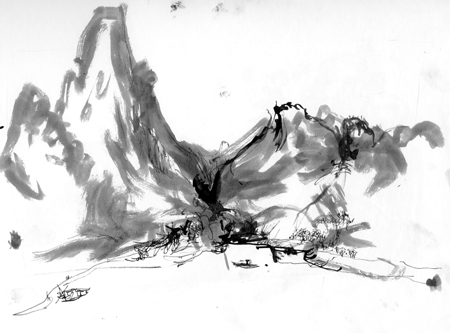
Then the next day we took a two and a half hour drive to see the rice terraces, terraces built up the sides of the mountain by the Yao people to grow rice. The terraces took 400 years to build and are unlike anything you can imagine. As are the Yao people. The women are known for their long hair, which grows to lengths longer than they are tall. Plus they keep hair that is cut off at their sixteenth birthday and also when they are married, and pile it on top of the already unbelievably long hair that they have. I was told by our guide that for ten yuan I could take a picture of one of these ladies unraveling their hair, but I declined. It wasn’t the ten yuan (about three US dollars); I would have given that to any of those people willingly. It was just the strange feeling that the exchange gave me, it seemed dehumanizing to both of us. I don’t know about all this ‘new Chinese prosperity’ we keep hearing about, most of the people we saw seem to be really struggling to get enough to eat. The rice terrace fields is where we saw the people yoked to a plow. That’s called HARD WORK. Imagine having to build terraces up the side of a mountain just to grow enough rice to eat? It’s unreal. And what a feat of engineering. Amazing. Guilin is certainly a place like no other.
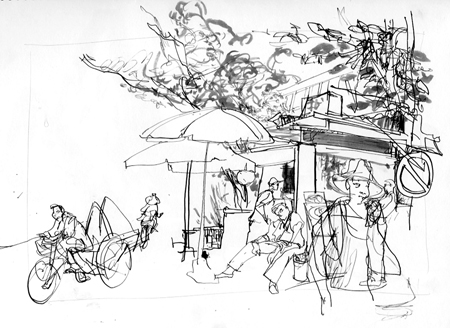
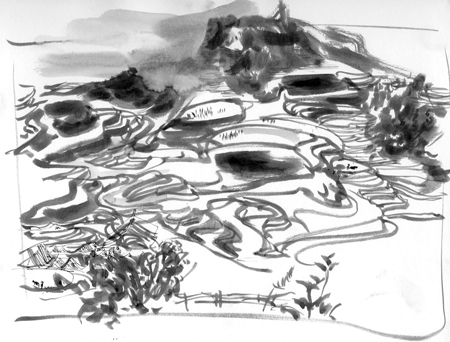
Nice, Ron! I can just hear your fellow air passengers thinking, laugh while you can, crazy Americans, soon enough you’ll be climbing into the raft!
That in-flight safety film sounded a little more than a dire possibility– more like, familiarization with the flght!
Your accounts of the trip are terrific– I hope you know S. J. Perelman’s “Eastward Ha!” illoed by Al Hirschfeld– you seem to be the one-man version of that. Reminds me of that– take more notes; I smell a book deal in the offing.
I am surprised you didn’t start a conversation with the Scotsman hotel operator– there’s a story– perhaps a lot more sinister than you speculated.
Hey! Next time some chick offers to unwrap her hair for $3– do it! She’s just sitting there, letting her hair grow, waiting for the next American short-hair to stroll by. It sounds like that prison trick of taking one’s pants off while still shackled in leg-irons– it shouldn’t be missed. De-humanized– hey, Ron, there’s nothing more de-humanizing than to be without $3!!!
I love these stories, Ronnie. Human oxen, cell-phone toting lady cabbies who are in charge of the road and girls with 6′ long hair (well, we won’t know what unwinding that’s like, will we?). I wish these entries were ten times as long– evocative images, too.
E
Hi Eliot, Thanks for your comments! Glad you are enjoying the posts.
As for the ladies with the six-foot long hair, yes, the unwrapping would have been interesting. My problem with it was that our guide was extremely prejudiced against the Yao people, and kept making remarks, like the explanation of how they weren’t as strong as the Han people and so had to live in the mountains, etc. She actually laughed and tossed her hair when we saw the people yoked to a plow and made some comment about people who were like water buffalo. It was apparent all over the place – Han Chinese men being carried up the mountain by Yao people who needed the Yuan, young Yao girls posing with middle aged Chinese (Han) business men for a few bucks. (Our guide also informed us that they imported girls from other areas, since the Yao girls weren’t that pretty! Unreal.) I don’t know, the open prejudices were just was starting to really make me bristle and there was no way I was going to contribute to the scene. Anyway, I don’t like posed photos.
Next time I go (which I definitely am going back some day – can’t get the place out of my mind!) I am going to be able to speak Mandarin and I’m going to rent my own car to drive up there. Guides are for the birds!!! – Ron